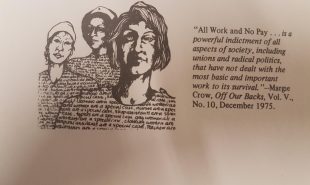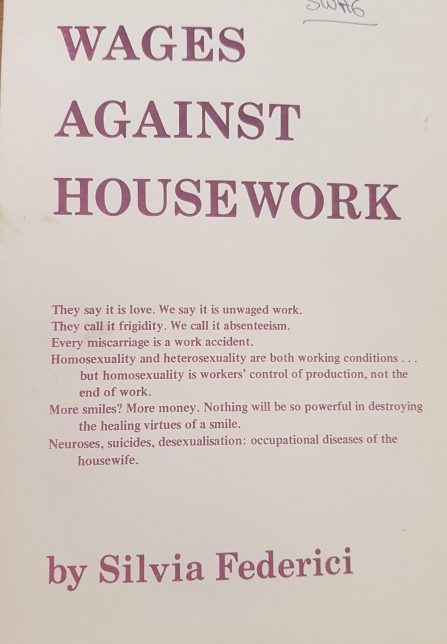Glasgow Women’s Library (GWL) is a unique treasure trove, which documents women’s history and struggle throughout society. Their archives, which deserve their own recognition, are home to numerous personal letters, photographs, reports and objects- all of which give us insight into the history of women’s lives and the gaps we have yet to fill. I have been given the exceptional opportunity as a student of Gender Studies at Stirling University to work at GWL which allows me access to boxes filled with newsletters, group minutes and booklets detailing issues affecting women. I am working on the St Andrews Women’s Liberation Movement Collection which records the aims, movements and struggles for women during the 1970’s and 1980’s.

The St Andrews Women’s Liberation Group was founded in 1970. Key members include Paula Jennings, Zoe Fairbairn, Jennifer Kerr-who has donated many pieces to GWL, Anne Jackson and Judith Ekins (Browne, 2016).The group were described as a ‘veritable hotbed of feminism’ by a male St Andrews university student in the university paper, illustrating the importance of the group in shaping feminist ideology and growth within St Andrews. Many of the conversations and topics discussed within the group’s newsletters are still of importance to women today which is why I think it is vital to preserve and research the working of previous liberation groups to highlight not only how far women’s right have progressed, but also the distance women still have to go in gaining equality. The group lobbied for impactful change for women and the rights they have to be an equal member of society without judgement and fear from men. They worked together with other liberation groups across the region and nation to challenge the patriarchal rule. Without them, feminism in Scotland might not be where it is today.
During my first few weeks spent in GWL I was free to rummage amongst the St Andrew’s Liberation Group boxes stored within the library’s archives. Here the history of women’s liberation was brought to life via the groups own newsletters, other liberation group newsletters, numerous booklets and pamphlets that the group collected, newspaper articles and photographs including photographs of the ‘Soho Sixteen and Reclaiming the Night’ rally in London, where women protested for the right to walk the streets at night without fear, an issue still relevant to women today. From the first box the information before me was overwhelming, you could literally spend hours reading through the information presented but I would like to share some of the most interesting and most impactful pieces, in my perspective, that I found in box number one.
- There were various items from the Women’s Lesbian Liberation Movement including issues from the St Andrews Lesbian Feminist Newsletter. The struggles of lesbian motherhood was particularly gripping to me and some of the personal accounts cited where highly emotive,

Wages against housework booklet women losing their children to be with their partners or women who stayed with their husbands for fear of losing their children and where as a consequence were threatened by rape by their husbands.
- Also within box one were various demands for women’s equal pay and anti-discriminatory laws. Within this there was campaign notes and articles on ‘wages for housewives’. The movement goes beyond women simply asking for women ?? and instead unites women who preform domestic tasks in order to gain recognition for their roles and break away from male dependency. They challenged the status quo of housework as women’s work by putting a wage on the tasks being performed, resulting in different standard of work being done in relation to money being earnt (Toupin, 2014).
The group were highly influential within St Andrews and Scotland as a whole, without them the feminist scene and the history of women’s liberation would not be where it is today. Thus, it is imperative we learn from the work of these movements and apply them to current societal issues affecting women’s lives.
Browne, S. (2016), ‘Women’s Liberation Movement in Scotland’, Manchester University Press
Toupin, L., (2014), ‘Wages for Housework: A History of an International Feminist Movement 1972-77, Pluto Press, London

Comments are closed.